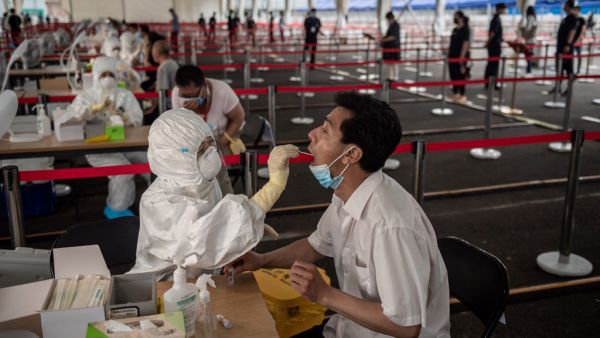China has recorded a new case of dengue fever on the same day the country confirmed a bubonic plague infection, according to officials.
A resident in the eastern Chinese city Guangde was diagnosed on Sunday with dengue fever, a deadly virus spread by infected mosquitos, the local health authorities said.
It comes after a herdsman in China's northern Inner Mongolia region has been detected to have bubonic plague over the weekend, known as the 'Black Death' in the Middle Ages.
Guangde government released a notice today on its social media account about the new case, according to state broadcaster CCTV.
The patient is said to have been receiving treatment at a local hospital since being diagnosed with dengue fever on June 5.
The resident has previously travelled to other Asian countries including India, Myanmar and Pakistan.
Health officials said that they are carrying out anti-virus efforts in nearby neighbourhoods following the new case.
The online post, however, appears to have been deleted from the government’s social media page.
It comes after Singapore is battling the worst outbreak in history caused by the infectious disease.
As of Monday, a total of 15,273 dengue fever infections have been reported in the city-state this year, according to the National Environment Agency (NEA).
Last week, Singapore reported 1,454 cases of the virus, the fourth consecutive week that cases have exceeded 1,000 and the largest weekly total ever recorded in Singapore.
At least sixteen people have died of the virus, Singapore reports, compared to 26 who have died from coronavirus. Singapore has 45,140 cases of coronavirus.
Those figures are expected to get progressively higher as the state moves deeper into mosquito breeding season, which began in June and lasts until October.
The officials believe that number is almost certain to exceed the 22,170 cases reported in 2013, the previous-worst outbreak, by the end of the year.
Starting from July 15, the Singaporean government will increase fines for people who fail to properly remove stagnant water, which the mosquitos use to breed.
Dengue fever is transmitted by the bite of the Aedes mosquito, which is commonly found in regions with humid, tropical climates.
People infected with the virus can experience high fever and muscle pains. Other symptoms include vomiting and headache, particularly behind the eyes.
A small number of cases develop severe symptoms, which include vomiting blood, rapid breathing, severe abdominal pain and fatigue.
But only around 25 per cent of patients would show symptoms. The disease has an incubation period of between five and ten days after a person is bitten, with symptoms lasting around a week.
China’s new infection of dengue fever comes after the country has seen a herdsman in Chinese northern Inner Mongolia region being diagnosed with bubonic plague, known as the 'Black Death' in the Middle Ages.
Bubonic plague is one of the most devastating diseases in history, having killed around 100million people in the 14th century.
But the World Health Organization (WHO) said Tuesday it was 'carefully' monitoring a case of bubonic plague in China after being notified by the authorities in Beijing.
A WHO official claimed today that the situation was being 'well managed' by China and not considered to represent a high risk.
The government of Bayan Nur, the Chinese city that reported the bubonic plague case, on Sunday issued an early epidemic warning after identifying the herdsman as a suspected patient. The city is also known as Bayannur.
The individual was confirmed to have the disease on the same day, sparking fears of a new disease outbreak amid the coronavirus pandemic.
Bayan Nur's Party secretary Chang Zhigang on Monday ordered the city's officials to ensure that all plague-prevention measures would be carried out thoroughly.
This article has been adapted from its original source.









